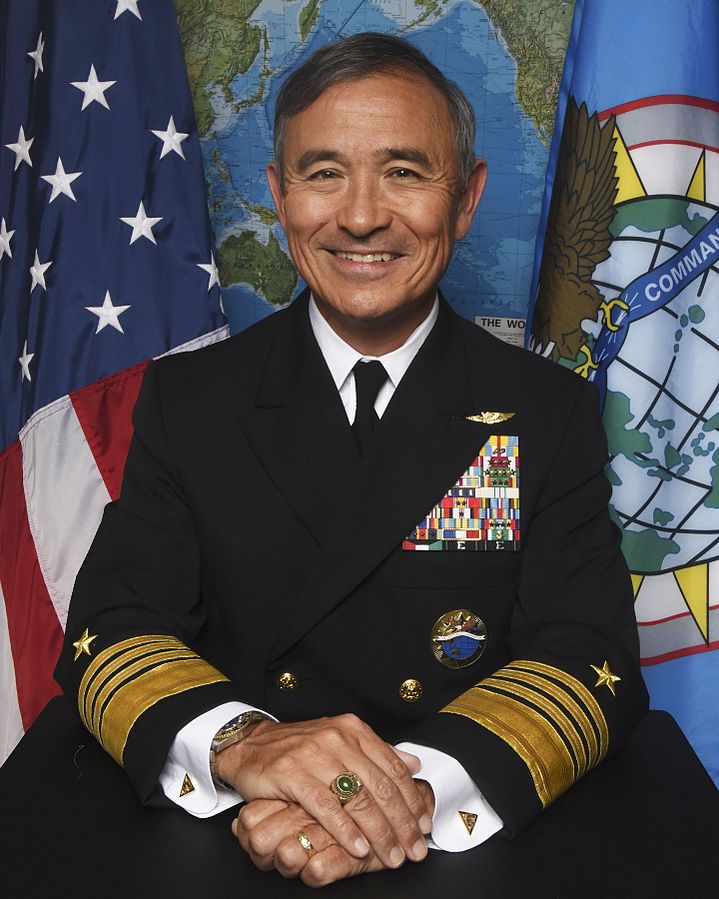 |
| Navy Adm. Harry B. Harris Jr (Image: Wiki Commons) |
By Amaani Lyle DoD News,
Defense Media Activity
WASHINGTON, Nov. 29, 2016 — As U.S. forces strengthen ties in the Indo-Asia-Pacific region, the island nation of Sri Lanka has emerged as a significant contributor to regional stability and security, U.S. Pacific Command’s commander said yesterday at the Galle Dialogue 2016 conference in Sri Lanka’s capital city of Colombo.
The first American four-star officer to visit Sri Lanka in almost a decade, Navy Adm. Harry B. Harris Jr. said at the two-day international maritime conference that he was pleased to see a deepened military-to-military relationship between Sri Lanka and the United States.
“To continue along a prosperous path, we must expand partnerships among like-minded nations to uphold the rules-based global operating system,” Harris said. “This helps build what [Defense Secretary Ash] Carter calls a ‘principled security network.’”
The network, Harris explained, ensures nations of all sizes have not only maritime access, but equal access to the other shared domains, including air, space, and cyber, within a system that has been underwriting prosperity throughout the Indo-Asia-Pacific for the last seven decades.
“The global operating system is a rising tide that can lift all nations who choose to enter it and to maintain it,” the admiral said.
Primed to become the hub of Indian Ocean, Sri Lanka has adopted maritime models from the U.S. Marine Corps, while the 11th Marine Expeditionary Unit arrived on the USS Somerset to train newly-minted Sri Lankan marines, Harris noted.
These developments illustrate Harris’s use of the term “Indo-Asia-Pacific” vice “Asia-Pacific” in describing the region.
“Indo-Asia-Pacific more accurately captures the fact that the Indian and Pacific Oceans are the economic lifeblood linking the Indian Subcontinent, Southeast Asia, Australia, Northeast Asia, Oceania, and the United States together,” the admiral said. “Oceans that once were physical and psychological barriers that kept us apart are now maritime superhighways that bring us together.”
Need for Regional Stability, Security
But, Harris said, a region without stability and security is hollow. “Peace and prosperity,” he said, “are made possible through adherence to the principles that are the foundation of the global operating system -- freedom of navigation and overflight for all civilian and military vessels, unimpeded lawful commerce, and the peaceful resolution of disputes.”
Harris characterized the long-standing success of those principles as free from abstraction or the whims of any singular nation. “They are not privileges to be granted or withdrawn,” he said.
The admiral cited U.N. peacekeeping operations in Lebanon, Mali, the Central African Republic and South Sudan as examples of promoting navigational freedom, which is especially important in light of the U.S. Navy ships’ first port visits to Sri Lanka since 2011.
“This validates the strengthening of military ties -- a benchmark event in the Sri Lanka-U.S. bilateral relationship,” he said.
Harris also recounted the USS Somerset and embarked Marines’ theater security cooperation exchange with the Sri Lankan navy, which he said focused on honing basic military skills and small-boat operations that could support humanitarian assistance and disaster relief missions.
“These engagements are clear demonstrations of our commitment to Sri Lanka and to this region,” the admiral said.
Ultimately, he said, expanded cooperation between the United States and Sri Lanka will benefit both countries in important and meaningful ways.
Maritime Security
Sri Lanka and the United States, as well as India and Australia, rightfully take maritime security in the Indian Ocean seriously as a result of grave regional challenges such as piracy, terrorism, illegal trafficking, and other threats to stability, Harris said.
“I’m particularly concerned about [Islamic State of Iraq and the Levant’s] influence in this region,” the admiral said. “We must also be ready to provide humanitarian assistance and disaster relief, and ensure unencumbered and safe navigation in the region’s vital shipping lanes.”
To gain maritime domain awareness requires an accurate operating picture and interoperable, shared information between navies and law enforcement, at both the national and regional levels, Harris said.
“This common operating picture will help us understand what those many vessels at sea are doing -- whether they are military or merchant ships lawfully operating in the exclusive economic zones, or commercial vessels potentially engaged in drug smuggling, illegal fishing or trafficking in persons,” the admiral said.
Harris acknowledged that building maritime domain awareness in the region will be a difficult -- but worthy -- task. And, as Pacom turns 70 years old Jan. 1, the admiral reflected on the command’s storied history.
“Since the end of World War II, we’ve represented America by fostering strategic partnerships with like-minded countries to enhance collective security, and we are strongly committed to doing this with Sri Lanka,” Harris said. “The Indian Ocean matters to the United States, Sri Lanka matters to the United States, and I believe that the United States matters to Sri Lanka.”

 Logging you in...
Logging you in...